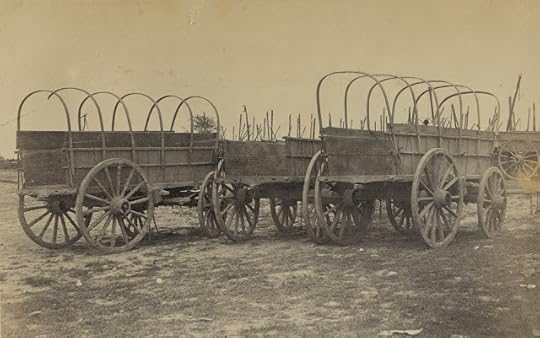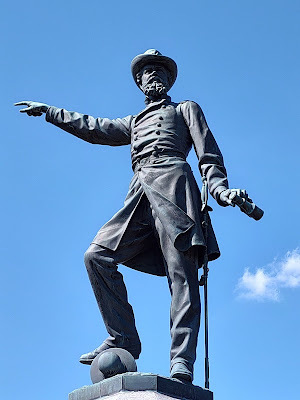With the Wagons at the Battle of Atlanta
It was noon on July 22, 1864. Quartermaster Sergeant Charles Wiles of the 78th Ohio was well behind the lines with the divisional wagon train, or so he thought.
"
At noon while our teams were corralled in the rear of our brigade, we were somewhat surprised at the appearance of a battery taking position on a hill just above us and the forming of a line of battle by a detachment of the 16th Corps," Wiles observed. "The sight was really beautiful, but foreboding of a fight, the character and approach of which we as yet knew nothing about. We were at once on the alert with everything in the wagons awaiting orders from our brigade quartermaster to move out. Five minutes had scarcely elapsed when we were ordered to move; the whips cracked sharply over the mule’s backs and we were moving hastily to the rear (if any there was) while the above mentioned battery started throwing its deadly missiles among the ranks of the advancing Rebels."Sergeant Wiles’ account of the epicBattle of Atlanta first saw publication in the August 11, 1864, edition of the ZanesvilleDaily Courier.
 Sherman's army depended first and foremost upon the railroads to maintain its logistical underpinnings, but the hard and heavy work of getting those supplies to the troops in the field fell upon sturdy army supply wagons such as the ones pictured above. Often pulled by six mule teams, supply trains usually did not function well under fire as the mules would quickly become panicked by the noise and confusion of battle. A mule stampede could be deadly to both man and beast.
Sherman's army depended first and foremost upon the railroads to maintain its logistical underpinnings, but the hard and heavy work of getting those supplies to the troops in the field fell upon sturdy army supply wagons such as the ones pictured above. Often pulled by six mule teams, supply trains usually did not function well under fire as the mules would quickly become panicked by the noise and confusion of battle. A mule stampede could be deadly to both man and beast. Camp nearAtlanta, Georgia
July 29,1864
Dearbrother,
Your letter mailed the 16thI received several days since together with one mailed the 13thcontaining stamps, combs, and good news generally. The combs, each of which Itried immediately upon opening the letter, give entire satisfaction. Bothletters I assure you would have been answered ere this had we not been on themove constantly ever since their receipt. Today we (I refer to our train) are encampedupon a hill by the side of a beautiful creek while the 78th Ohio ison the battle line monetarily expecting an attack from the Johnnies.
The past 10 days have been days ofremarkable as well as sad events. Many an undaunted Rebel is today non est,being summarily discharged by Yankee bullets and many, very many more, are incapacitatedby wounds from ever bearing arms again against their country and their own bestinterests, while a comparatively large number are our prisoners, being taken inas the boys familiarly term it. Would to God that they were all taken in orforced to surrender and forced to sue for peace; this is my prayer.
I will give you an outline of ourhistory during the past two weeks. Leaving our position on the right themorning of July 16, we arrived at Marietta the evening of the same day. Theplace presents a gloomy aspect though once perhaps the seat of wealth and prosperityas well as Southern chivalry and refinement. Leaving Marietta the morning ofthe 17th, we passed through Roswell, the seat of the RoswellFactory, rather extensively engaged in the manufacture of clothing for theRebel government, but now almost totally destroyed, having been burned by the16th Army Corps which passed the that place on the 29th.
Crossing the far-famed ChattahoocheeRiver at this place and marching some 3 miles distant, we encamped for thenight. The three days following were consumed with reaching Decatur, being onthe railroad running to Charleston, South Carolina, which road was at oncedestroyed for some distance. Decatur, like all Southern towns through which thearmy passes, is dilapidated and almost wholly deserted by the inhabitants. Ourcorps, the 17th, moved up and took position on the left during theafternoon of the 20th.
On the 21st, heavyskirmishing was kept up during the entire day while the Rebels occupied thenight massing their forces on our flank and the left center, held by Logan’s 15thCorps which expected movement of the Johnnies, was not discovered until themorning of the 22nd by our officers when considerable exertion wasmade to meet it. Nevertheless, this day was destined to be the scene of adreadful battle. At noon while our teams were corralled in the rear of ourbrigade, we were somewhat surprised at the appearance of a battery takingposition on a hill just above us and the forming of a line of battle by adetachment of the 16th Corps. The sight was really beautiful, butforeboding of a fight, the character and approach of which we as yet knewnothing about.
We were at once on the alert witheverything in the wagons awaiting orders from our brigade quartermaster to moveout. Five minutes had scarcely elapsed when we were ordered to move; the whipscracked sharply over the mule’s backs and we were moving hastily to the rear(if any there was) while the above mentioned battery started throwing itsdeadly missiles among the ranks of the advancing Rebels. At this moment, Isnatched from a wagoner our old split-bottomed chair which I stood upon andwatched the fiend-like Rebels as they filed through an embrasure in the woodssome 300 yards distant. Soon they came to a front then a charge ensued; suchmusketry and artillery firing! The bullets flew as thick as hail and the shellsburst in every direction. Health and self-preservation prompted me to find amore secure position as I was totally unarmed and had no business anywhereexcept with our teams.
 General James B. McPherson commanding the Army of the Tennessee was killed in one of the opening moves of the Battle of Atlanta.
General James B. McPherson commanding the Army of the Tennessee was killed in one of the opening moves of the Battle of Atlanta. At this junction, the Rebels advancedupon our brigade in front and almost simultaneously upon their rear, compellingthe boys to climb from one side of their earthworks to the other, at the sametime discharging their pieces and clubbing the Rebs from the works with thepieces reversed. Terrible was the conflict but like devils, our boys repulsedevery onset until the Rebs lay in piles right in their own ditches, stillholding their position. The color guards of the 78th Ohio were allshot down and one of the Rebs in the very act of seizing the colors was senthowling back by a blow from Captain Orr’s saber; the beautiful colors still waveddefiantly not destined to be polluted by Rebel hands. Thus, the battle rageduntil late in the afternoon when comparative quiet was restored.
Now could be heard the moaning of thewounded, heart-rending in the extreme. The living looked around them in searchof their missing comrades, finding some while the fate of others remained unknown.After a night of anxious solicitude, the morning of the 23rd dawnedand the boys resumed the search among the dead and wounded for their missing comradesfinding one dead here, another wounded there, and so on. Suffice it to say thatthe loss in our regiment in killed, wounded, and missing was 111 men.
Such a battle the veterans of the 78thOhio say they never participated in or ever wish repeated. For my part, I wouldfeel contented should I never again be compelled to witness such a terriblebattle. The general health of the regiment is not so good as might be expected.Diarrhea and flux prevail to some extent. My health continues good notwithstandingthe oppressively hot weather we are experiencing. The colonel is now in commandof the brigade, its former commander having been captured during the battle ofthe 22nd. J.P. Springer and son are both well although they areconstantly on the go transferring sick and wounded from the field to thehospitals.
The fate of Atlanta is sealed, it being only a question oftime with General Sherman as to when it shall be taken.
Source:
Letter fromQuartermaster Sergeant Charles C. Wiles, 78th Ohio VolunteerInfantry, Zanesville Daily Courier (Ohio), August 11, 1864, pg. 2
Daniel A. Masters's Blog
- Daniel A. Masters's profile
- 1 follower



